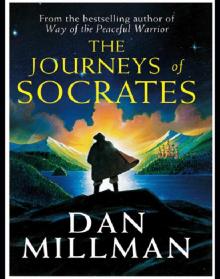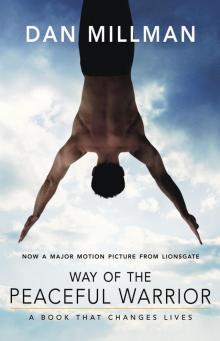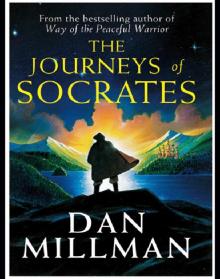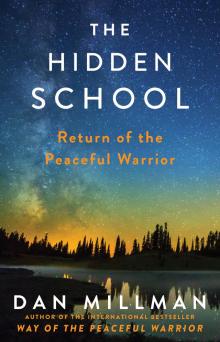- Home
- Dan Millman
The Journeys of Socrates: An Adventure
The Journeys of Socrates: An Adventure Read online
The
JOURNEYS
of
SOCRATES
DAN MILLMAN
I dedicate this book to the man I called Socrates,
and to you, my readers,
who asked me to tell his story.
Had I realized the trials my old mentor had faced
and the agonies suffered, I would have listened better,
and cherished even more the time we spent together.
I hope that I’ve done him both honor and justice
in sharing this journey into the life of a loving sage,
into the soul of a peaceful warrior.
DAN MILLMAN
Every journey has a
secret destination of which
the traveler is unaware.
MARTIN BUBER
Contents
EPIGRAPH
PROLOGUE
I’ve killed Dmitri Zakolyev.
PART ONE: The Bitter and the Sweet
1
Sergei was worried, that October day, when he was…
2
Heschel reached out to embrace his grandson; then…
3
A cold sun, barely visible through the blanket of clouds,…
4
With the map tucked safely away, Sergei entered…
5
A few weeks later Sergei’s group was about to start riding…
PART TWO: Survival of the Fittest
6
Sergei’s tenth, eleventh, and twelfth years marched by like…
7
The next day at dawn Instructor Orlov explained, “Now that…
8
After survival week, Sergei returned to the daily routines…
9
Sergei felt everything quickening—his thoughts, desires,…
10
On a bitter cold day in January, 1888, Sergei was released…
11
A near spill into the icy water pulled Sergei back to his senses.
PART THREE: Gain and Loss
12
As Sergei Ivanov was setting out on his long trek north, a…
13
By midsummer, Sergei had skirted the eastern edges of the Pale…
14
The day was already warm on that September morning when Sergei…
15
It began with lighthearted conversation over dinner, when Valeria…
16
Gregor Stakkos set out each day with clear purpose,…
17
In Mid-February, on a rainy morning just before they got out of…
18
When Gregor Stakkos and the one-armed giant Korolev…
19
June slipped into July and the full heat of a St. Petersburg…
20
During the reign of Tsar Aleksandr III and the period of…
21
Sergei and Anya had just finished their picnic meal,…
22
Sergei Ivanov came back to life with a gasp—to another life, a…
PART FOUR: The Warrior’s Way
23
In the summer of 1892, nearing his twentieth birthday, Sergei…
24
On a windy March day in 1893, Korolev returned from…
25
Sergei rode south along the river, then east, where he found…
26
As Dikar carried him west toward the River Don, Sergei…
PART FIVE: The Monastery Island
27
During the twelve hours it took for the two-masted ship…
28
Thus began Sergei Ivanov’s official residence at the Avraam…
29
Most of Zakolyev’s men, and all of the women they had…
30
Some weeks later, as Sergei prepared to begin the next…
31
When Paulina was eight or nine years old—no one kept track…
32
At the turn of the new century, a sense of peace and celebration…
33
After her morning session with Yergovich, Paulina raced…
34
It was spring of 1905. Nine years had passed since Sergei…
35
The years had not been kind to Dmitri Zakolyev, nor had the…
36
Over the next few days, Sergei spent hours in…
37
Having trained every afternoon for all those years, Sergei…
38
The next time Sergei saw Serafim, the old monk took him…
PART SIX: A Rising Storm
39
Two years passed. And on a perfect spring day in 1908 Sergei…
40
The next afternoon Sergei took Valeria and Andreas to…
41
That spring of 1908, fifteen-year-old Paulina disobeyed her…
42
By summer 1909, Sergei had searched for more than a year…
43
At that exact moment, as Dmitri Zakolyev lay sleeping,…
44
In April of 1910, as his search continued from village to village,…
45
On an otherwise pleasant day in early spring, the dogs…
46
Sergei left Heitzik’s village with little hope, but with new…
47
Even before the incident with Gumlinov’s horse, the men had…
48
By early afternoon of that day, Sergei had dropped far…
PART SEVEN: The Search for Peace
49
When the men returned in the late afternoon, a few…
50
The pounding rain, and a forest full of chirping insects,…
51
Twilight. A clearing sky at dusk. An anguished Paulina,…
52
Upon their arrival and joyous welcome in St. Petersburg,…
REVELATIONS FROM THE YEARS THAT FOLLOWED
ACKNOWLEDGMENTS
FOR INFORMATION AHOUT DAN MILLMAN’S WORK
ABOUT THE AUTHOR
BOOKS BY DAN MILLMAN
CREDITS
COPYRIGHT
ABOUT THE PUBLISHER
PROLOGUE
I’VE KILLED DMITRI ZAKOLYEV.
This thought, this stark reality, played over and over in Sergei’s mind as he lay belly down, straddling the moss-covered log, paddling as silently as he could through the frigid waters of Lake Krugloye, twenty-five kilometers north of Moscow. He was fleeing the Nevskiy Military School and his past—but he could not escape the fact of Zakolyev’s death.
Following a course roughly parallel to the shoreline, Sergei peered through the darkness to the wooded hills appearing and disappearing in the mist. The lake’s black surface, lit by faint slivers of moonlight, shimmered with each stroke. The sloshing water and bitter cold distracted Sergei for a few more moments before he thought again of Zakolyev’s body, lying in the mud.
Sergei could no longer feel his hands or legs—he had to make land before the waterlogged timber sank beneath him. Just a little farther, he thought, another kilometer before I head for shore.
This means of escape was slow and dangerous, but the lake had one distinct advantage: Water left no tracks.
Finally he angled in toward the shore, slipped from the log, and waded through the waist-high water, sucking mud, and sharp reeds at the water’s edge, up the sandy shore, and into the dark forest.
Sergei was fifteen years old, and a fugitive. He shivered not only from the cold, but from a sense of destiny, as if all the events of his life had brought him to that moment. As he threaded his way through thic
kets of pine and birch, he thought about what his grandfather had told him, and how it all began…
THAT AUTUMN OF 1872, chill winds blew west across the moss-covered Siberian tundra, sweeping over the Ural Range and north across the taiga, vast forests of birch and pine, lichens and shrubs, bordering the city of St. Petersburg, the crown jewel of Mother Russia.
Just outside the Winter Palace, wool-capped bodyguards of Aleksandr II marched along the Neva River, one of ninety waterways that flowed beneath eight hundred bridges, then past rows of small apartment buildings and church spires topped with crosses of the Orthodox Church. Not far from the river were city parks with statues of Peter the Great and Catherine and Pushkin—tsar, tsarina, and literary master—all standing sentry, bordered by street lamps just lit in the fading light of day.
Biting breezes snatched the last yellow leaves from thinning branches, tossed the woolen skirts of schoolgirls, and tousled the hair of two young boys wrestling in the front yard of a two-story home near Nevskiy Prospekt. In the bedroom window on the second floor, a gust of wind ruffled the curtains where Natalia Ivanova stood framed in the window. She pulled her shawl over her shoulders, closed the window a little, and gazed down into the small yard where her little son, Sasha, was playing with his friend Anatoly.
Anatoly ran toward Sasha, trying to tackle him. At the last instant, Sasha stepped aside and threw Anatoly over his hip, just the way his father had taught him. Proud of himself, Sasha crowed like a rooster. Such a strong boy, Natalia thought—like his father. She envied her son’s energy, especially now, when she had so little of it herself—tired most of the time since her belly had swollen with their second child. Natalia’s fatigue was no surprise. Yana Vaslakova, her neighbor, friend, and midwife, had warned her: “A woman of your fragile nature should not bear another child.” Yet she bore this new life and prayed daily for the strength to carry this child to full term even as the fainting spells had begun and a great fatigue had penetrated her bones.
Natalia hugged herself and shivered, wondering how little boys could play outside on a chill evening like this. She called out the window, “Sasha! Anatoly! Soon it will rain. You boys come in!” Her weary voice hardly carried over the wind. Besides, six-year-old ears heard only what they wished.
With a sigh, Natalia returned to the small couch where she’d been speaking with Yana and sat with a sigh, brushing her long black hair. Sergei would be home soon. She wanted to look as pretty as she could.
Vaslakova said, “You rest, Natalia. I’ll let myself out and shoo the boys inside.” As her friend went downstairs, Natalia heard the patter of rain on the sill, then something else, directly overhead—the scuttle of young feet and mischievous squeals. They’ve climbed the trellis again, she thought. In the mixture of anger and anxiety felt by all mothers of small boys who fancy themselves invulnerable, Natalia cried up to the rooftop, “You boys climb down from the roof this instant! And be careful!”
Laughter and more scuffling as the boys wrestled on the rooftop.
“Come down now or I shall tell your father!”
“All right, Mamochka,” Sasha called sweetly to curry her favor. “Just don’t tell Father!” More giggles.
As Natalia turned back to lay her brush down, everything changed in one sudden, sickening lurch. Young laughter turned to descending screams. Then silence.
Natalia ran to the window. To her horror, two bodies lay below.
The next moment, it seemed, Natalia found herself outside, kneeling in the mud. As she cradled her lifeless boy in her arms, the tears and rain running down her face, she rocked to and fro in the timeless rhythm of a mother’s agony.
Then a knotlike pain in her womb ripped her back from the abyss, and Natalia became vaguely aware of Vaslakova and a man standing beside her. As Vaslakova helped Natalia to her feet, the man tried to lift the burden from her arms. Natalia fought him off but froze when a boy’s shrill cry rang out—she looked quickly down to her Sasha, but it was the other boy, Anatoly, whose leg was broken.
Vaslakova helped Natalia inside before the pain took her again. She doubled over and collapsed in the doorway. Where is Sasha? she wondered. He should come in. It is cold, so cold.
When she awoke, Natalia found herself in bed, attended to by the midwife. All at once she knew: The baby is coming…too soon…two months early. Or have the months passed without my notice? she thought. Where am I? Where is Sergei? He will know if this is a dream. Sergei will smile and stroke my hair and tell me that Sasha is fine…that everything is all right.
Ah! The pain! Is something wrong? Where is my Sasha? Where is Sergei?
SERGEI IVANOV ARRIVED HOME to find neighbors in his front yard, standing in the rain. He saw their faces and rushed inside. Vaslakova told him the news: Sasha was dead—a fall from the rooftop. Natalia had gone into labor…the bleeding wouldn’t stop…nothing to be done. Both of them gone.
But their baby lived. A son born so early he probably wouldn’t survive. Vaslakova had seen many births, many deaths. Death is easy, she thought, but hard on those left behind. A priest would soon arrive to perform last rites for Natalia and Sasha, and likely the infant as well.
Vaslakova placed Sergei’s tiny son in his arms and told the distraught father that the child was too weak to suckle, but a little goat’s milk, squeezed from a cloth, might sustain the boy if he lived through the night.
Sergei looked down at the wizened little face of the infant boy, swaddled tightly in a blanket Natalia had made. He barely heard Mrs. Vaslakova say, “Natalia’s last words before she faded away…she said she loved you with all her heart…and asked that you give her son into the care of her parents…”
Even while dying, Natalia had thought about what was best for her child…and her husband. She knew that Sergei, a member of the streltsy, elite bodyguards to the tsar, could not care for their tiny son. Could she also have foreseen that every time he looked at the boy, he would think of this dark day?
The priest arrived and baptized the infant in case he should die, for the sake of his soul. When he asked the infant’s name, the distracted father replied, “Sergei,” thinking that the priest had asked for his own name. So it was done: The child took the name of the father.
Midwife Vaslakova offered to care for the child through the night.
Sergei nodded slowly. “If he lives until morning…please deliver him to his grandparents.” He told her the address and their names—Heschel and Esther Rabinowitz. Jews. This did not sit well with him, but they would love the child and raise him safely. So he did as Natalia had asked. Sergei could never refuse her anything—in life or in death. That day in autumn marked the beginning of Sergei Ivanov’s descent into death, even as his tiny son was clinging to life.
EIGHT YEARS LATER, on a dark October night, Heschel Rabinowitz sat alone in the third railway car on a train bound for Moscow. He gazed out the window in thoughtful repose, half dozing in the manner of old men, hardly aware of the passing forests or settlement huts just visible in the first light of dawn. Heschel dozed and dreamed and stared. Memories moved through his mind like vistas flashing past the train’s muddy window: his daughter Natalia in a red dress, her face bright…a photograph of Sasha, the grandson he had never met…and the beautiful, aged face of his beloved Esther. Gone now, all of them.
Heschel squeezed his eyes tightly as if to shut out the past. Then his eyes relaxed and he smiled as another vision appeared—the face of a three-year-old boy with eyes too large for his skinny body, reaching up to his grandfather…
The conductor’s voice, announcing the train’s arrival, jarred Heschel from his reverie. With a yawn, he stood painfully, stretching his joints. He pulled his old coat tightly around him, scratched his snow white beard, and adjusted the wire-rimmed spectacles on his large nose. Departing strangers jostled the old Jew, but he took little notice. Holding his satchel protectively in front of his chest as one might carry an infant, he descended to the platform and shuffled through a cloud of steam in th
e cold morning air. He looked skyward. Soon the first snow would fall.
Heschel straightened his cap and focused his wandering mind toward the north. He would have to find passage in the cart or wagon of a willing farmer, half a day’s ride into the hills.
It would not be an easy journey. Heschel’s back, eroded by countless hours at his workbench, was curved like the violins he fashioned from aged maple, spruce, and ebony. Heschel also made precision clocks. He had learned both trades as a boy—one from his father and the other from his grandfather. Unable to favor one craft over the other, he would first construct a violin, then a clock, alternating for variety. Even at his age, despite the aches in the joints of his fingers, he worked diligently, shaping each violin as if it were his first and each clock as if it were his last.
Soon after Heschel had learned these two crafts, his father had left him the workshop and journeyed to the East to trade in gems. Later his father’s wealth and generosity enabled Heschel, a Jew, to continue living within the city of St. Petersburg, where he and his wife, Esther, had shared an apartment.
Heschel reflected on these memories as he carried his satchel out of the train station with a slow, halting gait, toward the main road out of the city.

 SACRED JOURNEY OF THE PEACEFUL WARRIOR
SACRED JOURNEY OF THE PEACEFUL WARRIOR The Journeys of Socrates: An Adventure
The Journeys of Socrates: An Adventure WAY OF THE PEACEFUL WARRIOR: A Book That Changes Lives
WAY OF THE PEACEFUL WARRIOR: A Book That Changes Lives The Journeys of Socrates
The Journeys of Socrates The Hidden School
The Hidden School